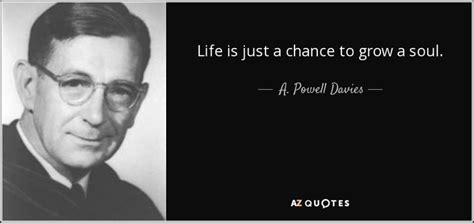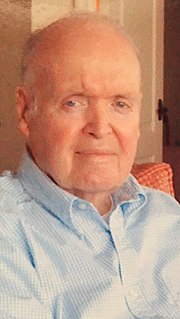A Quote by Carl Jung
A human being would certainly not grow to be seventy or eighty years old if this longevity had no meaning for the species. The afternoon of human life must also have a significance of its own and cannot be merely a pitiful appendage to life's morning.
Related Quotes
I think, questions about what it means to respect nature become very important because just as in human society, for example, part of what it is for me to live a good life as a human being in a human society is to have respect for others around me. Now, that respect, to some extent, can be thought of as being grounded in the rights and interest of others but it also has to do with the stance that I take in the world and what it is that provides meaning and significance in my own life and I think there are similar ideas of respect for nature that apply as well.
For the past eighty years I have started each day in the same manner. It is not a mechanical routine, but something essential to my daily life. I go to the piano, and play two preludes and fugues of Bach. I cannot think of doing otherwise. It is a sort of benediction on the house. But that is not its only meaning for me. It is a rediscovery of the world of which I have the joy of being a part. It fills me with awareness of the wonder of life, with a feeling of the incredible marvel of being a human being.
I am afraid, ... that health begins, after seventy, and often long before, to have a meaning different from that which it had at thirty. But it is culpable to murmur at the established order of the creation, as it is vain to oppose it. He that lives, must grow old; and he that would rather grow old than die, has God to thank for the infirmities of old age.
Destruction of the embryo in the mother's womb is a violation of the right to live which God has bestowed upon this nascent life. To raise the question whether we are here concerned already with a human being or not is merely to confuse the issue. The simple fact is that God certainly intended to create a human being and that this nascent human being has been deliberately deprived of his life. And that is nothing but murder.
The trouble with steeling yourself against the harshness of reality is that the same steel that secures your life against being destroyed secures your life also against being opened up and transformed by the holy power that life itself comes from. You can survive on your own. You can grow strong on your own. You can even prevail on your own. But you cannot become human on your own.
Human life has no meaning independent of itself. There is no cosmic force or deity to give it meaning or significance. There is no ultimate destiny for man. Such a belief is an illusion of humankind's infancy. The meaning of life is what we choose to give it. Meaning grows out of human purposes alone. Nature provides us with an infinite range of opportunities, but it is only our vision and our action that select and realize those that we desire.
The opposite of Taking A Risk is of course Playing It Safe The latter would probably be a reasonable way of life for seventy or eighty years if you had a contract to live for a thousand years. However, since you know that is out of the question, you must admit, Playing It Safe is a pretty dull way to live. Those who play it safe are generally not too exciting, in fact they would probably border on being very boring personalities. On a score of one to ten as a Risk Taker where do you stand? Add a little spice to your life today and take a risk.
We might expect intelligent life and technological communities to have emerged in the universe billions of years ago. Given that human society is only a few thousand years old, and that human technological society is mere centuries old, the nature of a community with millions or even billions of years of technological and social progress cannot even be imagined. ... What would we make of a billion-year-old technological community?
The life-efficiency and adaptability of the computer must be questioned. Its judicious use depends upon the availability of its human employers quite literally to keep their own heads, not merely to scrutinize the programming but to reserve for themselves the right of ultimate decision. No automatic system can be intelligently run byautomatonsor by people who dare not assert human intuition, human autonomy, human purpose.
What is there to understand? The significance of life? How long will it take to understand the significance and the meaning of life? 20 years? 30 years? And the same question will be here in another 20 years, I guarantee you. Until you stop asking that question. When that question is not there, you are there. So that's the reason why you keep asking the question: you do not want the question to come to an end. When that comes to an end, there will not be anybody, left there, to find out the meaning, the purpose and the significance of life.
The mystery of being human and, certainly, of being a Catholic lies in our embracing together the imperfect state known as the human condition. First and foremost, if we could ever be perfect or do things perfectly, we would eliminate mystery, an essential ingredient in the good life and the spiritual life.
It must be stressed that there is nothing insulting about looking at people as animals. We are animals, after all. Homo sapiens is a species of primate, a biological phenomenon dominated by biological rules, like any other species. Human nature is no more than one particular kind of animal nature. Agreed, the human species is an extraordinary animal; but all other species are also extraordinary animals, each in their own way, and the scientific man-watcher can bring many fresh insights to the study of human affairs if he can retain this basic attitude of evolutionary humility.


































